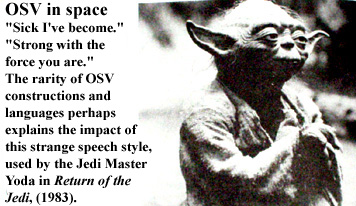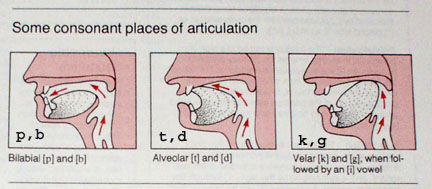|
Degoels (yl Dafhkin)
Degoels (en espanol)
Perhaps my biggest hobby is the study of language and linguistics. Ever since the eighth grade when I took Spanish I,
I became hooked. I can still recall realizing at age 12 that the letter J in English is actually two distinct sounds squished
together. A few years later, as I studied phonology on my own I discovered that I was right. I love language. Foreign languages,
dead languages, the history of languages, how language is used, and when, and by whom, and for what, etc.
Okay, this
is part where I either lose your interest all together or you are still hanging on waiting for it make some sense. This is
admittedly the geek in me. But everyone has some strange hobby or interest that other people scoff at or laugh at. Millions
of people watch Star Trek every week, but how often do we make fun of Trekkers? And though I understand that most people do
not share my affinity for linguistics, I find myself in detailed conversations all the time with individuals that find fascinating
some aspect of linguistics. They just didn't realize that it was linguistics.

I have always wanted a house full of bookshelves. There will be at least one Library Room in that house I will have when
I am settled... and rich. I never throw books away. (Well except for that eighth grade copy of Jane Eyre, but I burned that
one, so I suppose it doesn't count.) I have a bookshelf in my bedroom that is purely lexical and grammatical books on foreign
languages. From American Sign Language to Thai. Over 100 books. I also have a few shelves in another room with linguistic
texts. Books from "Introduction to Historical Linguistics" to "The Development of Language in Children". "Writing Systems
of the World" to "Chomsky's Universal Grammar". "Bad Language" to every old text book this former college linguistics major
ever owned.

|
 |
|
|
|
 |
|

I have always been the most interested in three main aspects of Linguistics. Sociolinguistics, Morphophonology, and Orthography.
Sociolinguistics looks at how language can reflect social aspects of an individual or a whole community. When a person uses
a particular grammar, another person might immediately assume that they were from a certain social or economic group. Likewise,
if that person used a certain accent or dialect, the other person might assume their regional or national background. Morphophonology
examines how sounds are affected with variations, derivations, and compounds of word structures. A very simple example is
the difference between how the plural -s acts at the end of words. It sounds like S when added to the word cop. Cops. But
it sounds more like a Z when added to the word cobb. Cobbs. Trust me, it gets a hell of a lot more interesting than that.
And Orthography, well that is simply the writing used to represent spoken language.

I entertain myself almost every day with language and linguistics. Whether it be simply studying Finnish, Irish Gaelic,
or Georgian. Or trying to make my own crossword puzzle - in Russian. I even play with concepts in language in imaginary paradigms
to try out theoretical processes. For example, I might create a list of sounds to use as a base while I experiment to see
just how far a language might be able to use phonetic contraction in word formation and derivation. Hey! That's what I call
fun. And I have been known to sit in front of the television while mindlessly translating a poem or a passage from some classic
novel into Swedish, or Basque, or Catalan, or Old English, or whatever.
|
 |
|
|
|

